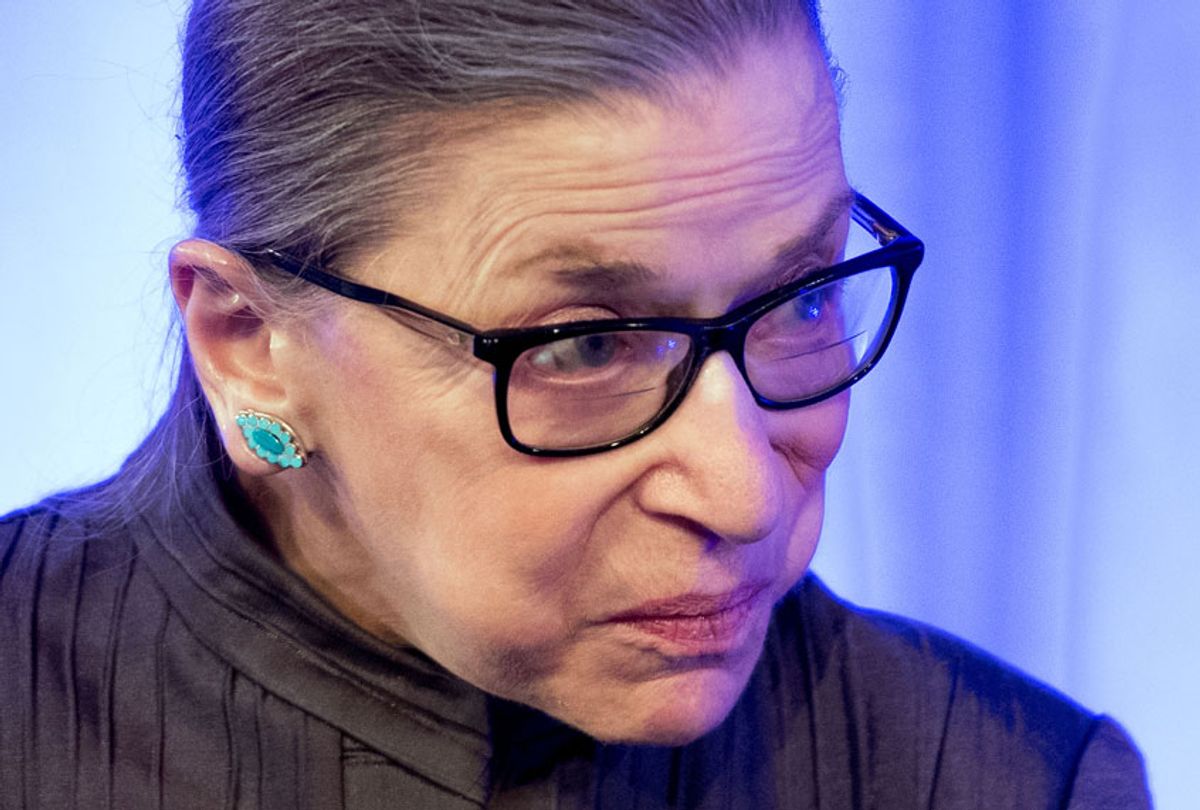Justice Ruth Bader Ginsburg, a pioneering advocate for gender equality who became a cultural icon among liberals, died on Friday, the Supreme Court announced.
She was 87 years old.
"Our nation has lost a justice of historic stature," Chief Justice John Roberts said in a statement. "We at the Supreme Court have lost a cherished colleague. Today we mourn but with confidence that future generations will remember Ruth Bader Ginsburg as we knew her — a tried and resolute champion of justice."
Ginsburg, who had battled cancer over the last several years, died of "complications of metastatic pancreas cancer" at her home, the court said. She was surrounded by her family.
Ginsburg served 27 years on the court, and was widely seen as a diminutive firebrand with a brilliant mind, whose legal acumen was revered across the political spectrum. One of her closest friends was the late Justice Antonin Scalia, although they were ideologically opposed on many issues.
In her final years Ginsburg became the leader of the court's liberal wing, a partisan figure and cultural totem whose fans dubbed her "Notorious RBG" after rapper and fellow Brooklynite Notorious BIG. She accrued a cult following thanks to her physical and mental endurance, her commitment to equality and her frequent rebukes of President Donald Trump, whose candidacy she publicly criticized, breaking with long-held court norms.
Her death will have profound political implications amid a volatile campaign season, and presumably gives Trump the chance to name a replacement, an option he has so far reserved for himself even at such a late point in his first term.
Just hours after news of Ginsburg's passing, Senate Majority Leader Mitch McConnell — who took the unprecedented step in 2016 of blocking President Barack Obama's nomination of Judge Merrick Garland for Scalia's former seat, which Trump filled with Justice Neil Gorsuch in the first months of his term — confirmed that he intended to hold a vote on a replacement before the election. That is likely to launch a firestorm, with activists on both the right and left highly engaged.
Confirmation hearings held this late in an election cycle already riven with vitriol and social unrest are certain to be explosive, and the vacancy is certain to play a central role the presidential campaign. The court is just weeks away from starting its next term, and Ginsburg's passing means that Chief Justice John Roberts, a conservative who has sided with liberals on multiple landmark decisions, will no longer wield the controlling vote in tight cases — rendering outcomes uncertain until the seat is filled.
Several major cases loom. The week after the election, the court will once again hear a Republican challenge to the Affordable Care Act, a law it upheld in 2012 by a 5-4 vote, with Roberts writing the majority opinion.
Ginsburg was born in Brooklyn, New York, in 1933. She attended Cornell, where she met her future husband, Marty, moving to Oklahoma, where she gave birth to their first child. The family returned to the East Coast, where Ginsburg entered Harvard Law School — one of nine women in a class of over 500. The dean at the time, Ginsburg recounted later, asked her why she'd taken a slot that "should go to a man."
Her husband then took a job in New York and she transferred to law school at Columbia, where she received her degree.
In the 1970s Ginsburg became the director of the Women's Rights Project of the American Civil Liberties Union, arguing and winning precedent-setting gender discrimination cases before the Supreme Court.
In an NPR interview, she explained the theory behind those arguments.
"The words of the 14th Amendment's equal protection clause: 'Nor shall any state deny to any person the equal protection of the laws.' Well that word, 'any person,' covers women as well as men," Ginsburg said. "And the Supreme Court woke up to that reality in 1971."
President Jimmy Carter named her to the U.S. Court of Appeals in 1980. In a statement upon her death, he called her "a powerful legal mind" and "a beacon of justice."
President Bill Clinton nominated Ginsburg for the Supreme Court in 1993, when she was 60. She was the second woman named to the court after Justice Sandra Day O'Connor, who had been appointed by Ronald Reagan in 1981.
During Obama's administration, some liberals called on Ginsburg to retire so a Democratic president could name her successor. She declined, out of dedication to her life's work, as well as a wariness that the Republican-controlled Senate might not hold hearings for a successor — a hunch that eventually played out after Scalia's death.
Ginsburg publicly criticized Trump ahead of the 2016 election, and in response he tweeted that "her mind is shot" and demanded that she resign. Ginsburg later acknowledged she had made a mistake by weighing in on a presidential campaign.
Days before she died, Ginsburg reportedly dictated a statement to her granddaughter: "My most fervent wish is that I will not be replaced until a new president is installed."

Shares